Related Research Articles
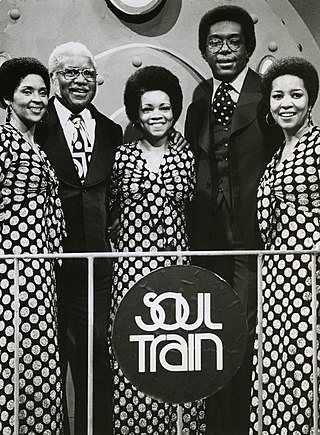
The Staple Singers were an American gospel, soul, and R&B singing group. Roebuck "Pops" Staples, the patriarch of the family, formed the group with his children Cleotha, Pervis, and Mavis. Yvonne replaced her brother when he was drafted into the U.S. Army, and again in 1970. They are best known for their 1970s hits "Respect Yourself", "I'll Take You There", "If You're Ready ", and "Let's Do It Again". While the family name is Staples, the group used "Staple" commercially.
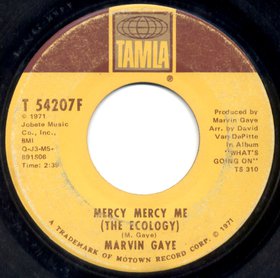
"Mercy Mercy Me (The Ecology)" is the second single from American singer-songwriter Marvin Gaye's 1971 album, What's Going On. Following the breakthrough of the title track's success, the song, written solely by Gaye, became regarded as one of popular music's most poignant anthems of sorrow regarding the environment. Led by Gaye playing piano, strings conducted by Paul Riser and David Van De Pitte, multi-tracking vocals from Gaye and the Andantes, multiple background instruments provided by the Funk Brothers and a leading sax solo by Wild Bill Moore, the song rose to number 4 on Billboard's Pop Singles chart and number one for two weeks on the R&B Singles charts on August 14 through to August 27, 1971. The distinctive percussive sound heard on the track was a wood block struck by a rubber mallet, drenched in studio reverb. The song also brought Gaye one of his rare appearances on the Adult Contemporary chart, where it peaked at number 34. In Canada, "Mercy Mercy Me" spent two weeks at number 9.

"You're All I Need to Get By" is a song recorded by the American R&B/soul duo Marvin Gaye and Tammi Terrell and released on Motown Records' Tamla label in 1968. It was the basis for the 1995 single "I'll Be There for You/You're All I Need to Get By" from Method Man and Mary J. Blige.
Claudja Barry is a Jamaican-born Canadian singer. Her successful songs were "Down and Counting", "Boogie Woogie Dancin' Shoes", "Dancing Fever", and others. As an actress, she is known for appearing in the European versions of stage musicals AC/DC and Catch My Soul.

"Family Affair" is a 1971 number-one hit single recorded by Sly and the Family Stone for the Epic Records label. Their first new material since the double A-sided single "Thank You "/ "Everybody Is a Star" nearly two years prior, "Family Affair" became the third and final number-one pop single for the band. In 2021, Rolling Stone magazine ranked the song 57th on their list of the 500 Greatest Songs of All Time. The cover version by John Legend, Joss Stone, and Van Hunt, won the Grammy Award for Best R&B Performance by a Duo or Group with Vocals at 49th Annual Grammy Awards.
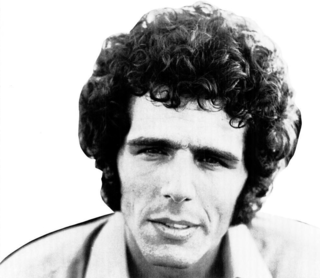
Robert Bloom was an American singer-songwriter. He is known best for the upbeat 1970 hit, "Montego Bay", which was co-written with and produced by Jeff Barry.

"Proud Mary" is a song by American rock band Creedence Clearwater Revival, written by vocalist and lead guitarist John Fogerty. It was released as a single in January 1969 by Fantasy Records and on the band's second studio album, Bayou Country. The song became a major hit in the United States, peaking at No. 2 on the Billboard Hot 100 in March 1969, the first of five singles to peak at No. 2 for the group.
"Dream Lover" is a song written by American musician Bobby Darin. Darin recorded his composition on March 5, 1959 and released it as a single the following month. It was produced by Ahmet Ertegun and Jerry Wexler and engineered by Tom Dowd.

"Mr. Big Stuff" is a song by American singer Jean Knight. The song was released in 1971 on the Stax label as a single from Knight's debut album of the same title, and became a big hit in the US, reaching No. 2 on Billboard Hot 100. The song was certified double platinum and was the No. 1 Soul Single of the year.

"Piece of My Heart" is a romantic soul song written by Jerry Ragovoy and Bert Berns, originally recorded by Erma Franklin in 1967. Franklin's single peaked in December 1967 at number 10 on the Billboard Hot Rhythm & Blues Singles chart in the United States.

"I'll Take You There" is a song written by Al Bell, and originally performed by soul/gospel family band the Staple Singers. The Staple Singers version, produced by Bell, was released on Stax Records in February 1972, and spent a total of 15 weeks on the charts and reached #1 on the Billboard Hot 100. By December 1972, it had sold 2 million units and is ranked as the 19th biggest American hit of 1972. It remains one of the best-selling gospel songs of all time.
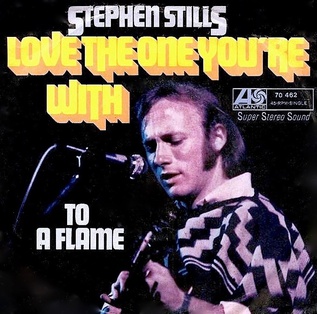
"Love the One You're With" is a song by American folk rock musician Stephen Stills. It was released as the lead single from his debut self-titled studio album in November 1970. The song, inspired by a remark Stills heard from musician Billy Preston, became his biggest hit single, peaking at No. 14 on the Billboard Hot 100 in early 1971. David Crosby and Graham Nash, Stills's fellow members of Crosby, Stills & Nash, provide background vocals on the song. Also providing the backups are Rita Coolidge, her sister Priscilla Jones, and John Sebastian. They all sing the "Do Dos" that come before the instrumental portion and the outro. The song was also recorded by the Isley Brothers, The Meters, Bucks Fizz, Luther Vandross, Bob Seger and Richard Clapton, among others.

"Montego Bay" is a song co-written and performed by Bobby Bloom about the city in Jamaica of the same name. The song was a top ten hit for Bloom in the Fall of 1970 on both sides of the Atlantic. It reached No. 3 on the UK Singles Chart, No. 5 on the Canadian RPM 100 Singles Chart, No. 7 on the Australian Go-Set Singles Chart and No. 8 on the US Billboard Hot 100. The song was co-written and produced by Jeff Barry. In the master tape of the song, Bloom breaks into a chorus of "Oh, What a Beautiful Mornin'" at the end of the recording. The song features a whistler, as well as Jamaican instruments in a calypso style.

"How 'Bout Us" is the most successful single released by R&B music group Champaign. Composed by band keyboardist Dana Walden and originally released on the band's debut album How 'Bout Us, the title track peaked at number 12 on the Billboard Hot 100. A romantic ballad, the song was released on Valentine's Day, 1981.

"I Just Can't Help Believing" is a song written by Barry Mann and Cynthia Weil.
"With Pen in Hand" is a song written by Bobby Goldsboro and first released on his March 1968 album, Honey. The song's lyrics address the subjects of divorce and losing custody of one's child, and are sung from the perspective of the parent who expects to be losing custody of their child, as they make a final plea to their spouse to reconcile before the divorce is finalized. "With Pen in Hand" has been a hit for multiple artists in the late 1960s and 1970s.
John Linde is an American music producer. Musically, he has been involved in genres which include, doo-wop, r&b, soul, pop, and heavy rock. As a producer, his work includes the albums The Beat Goes On for Vanilla Fudge, Sir Lord Baltimore by Sir Lord Baltimore, and A Mouth in The Clouds for The Group Image. He produced the singles, "Where Are We Going" by Bobby Bloom, "A Touch of Baby" for The Tymes, "The Letter" for The Outrage and others. He has also composed hits for Peter Antell, The Percells and Bobby Bloom.
"Make Me Happy" is a song by Bobby Bloom, released on MGM in 1970. It was written by Bloom and Jeff Barry. It became a hit for Bloom in early 1971.
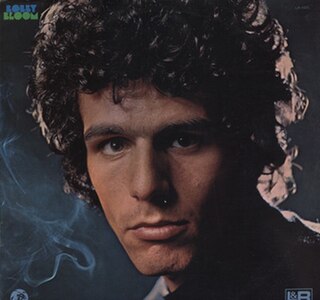
The Bobby Bloom Album was the first album for composer, producer and singer Bobby Bloom. It charted in late 1970 through to early 1971. It contained his hits "Montego Bay" and "Heavy Makes You Happy".
"Sha La La Boom Boom" was a single for Bobby Bloom in 1972. Co-written by Bloom with Jeff Barry, it became a hit and reached the Cash Box, Billboard and Record World charts early the following year. It was a new attempt of an earlier song.
References
- ↑ Music Metason - ArtistInfo, Bobby Bloom, Heavy Makes You Happy
- ↑ TV Pop Diaries - 1971, Thursday 21st January 1971
- ↑ Melody Maker, January 30, 1971 - Page 2 Melody Maker Pop 30 28 (-) HEAVY MAKES YOU HAPPY
- ↑ Official Charts - HEAVY MAKES YOU HAPPY by BOBBY BLOOM
- 1 2 Marsh, Dave (1989). The Heart of Rock & Soul: The 1001 Greatest Singles Ever Made. Plume. p. 577. ISBN 0-452-26305-0.
- ↑ #RecordsAndCharts - Cash Box chart run Staple Singers Heavy Makes You Happy (Sha-Na-Boom Boom)
- ↑ Billboard, February 6, 1971 - Page 42 Soul, BEST SELLING Billboard Soul Singles, This Week 33, Last Week _, Weeks on Chart 5
- ↑ Discogs - The Staple Singers – Heavy Makes You Happy (Sha-Na-Boom Boom) / Love Is Plentiful
- ↑ Billboard, February 6, 1971 - Page 42 Soul, BEST SELLING Billboard Soul Singles, This Week 33, Last Week _, Weeks on Chart 5
- ↑ Second Hand Songs - Heavy Make You Happy (Sha-Na-Boom Boom) by The Staple Singers
- ↑ Cash Box, February 6, 1971 - Page 24 New Additions to Radio Playlists – Primary Markets
- ↑ Billboard, February 6, 1971 - Page 76 Billboard HOT 100 For Week Ending Feb. 6, 1971, THIS WEEK 97, LAST WEEK _, Weeks On Chart 1
- ↑ #RecordsAndCharts - Cash Box chart run Staple Singers Heavy Makes You Happy (Sha-Na-Boom Boom), Hot 100
- ↑ Billboard, February 6, 1971 - Page 42 Soul, BEST SELLING Billboard Soul Singles, This Week 33, Last Week _, Weeks on Chart 5
- ↑ #RecordsAndCharts - Cash Box chart run Staple Singers Heavy Makes You Happy (Sha-Na-Boom Boom), Soul Singles
- ↑ Cash Box, February 20, 1971 - Page 4 Cash Box TOP 100, 93, _, _
- ↑ #RecordsAndCharts - Cash Box chart run Staple Singers Heavy Makes You Happy (Sha-Na-Boom Boom, Cash Box)
- ↑ Second Hand Songs - Heavy Makes You Happy by Bobby Bloom, VERSIONS
- ↑ Second Hand Songs - Heavy Makes You Happy by Bobby Bloom, VERSIONS